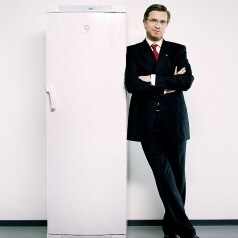Electrolux CEO Hans Stråberg challenged policy-makers to introduce consumer incentives for exchanging outdated, energy-thirsty appliances in an op-ed piece in Dagens Industri, Sweden’s leading industry newspaper (August 24, 2009).
Using research from McKinsey & Company as the backbone of his message, Stråberg pointed out that tax incentives to encourage the replacement of old appliances with energy-smart counterparts are proven to have the greatest environmental benefit in relation to investment. McKinsey compared 200 different measures to reduce climate change-inducing emissions.
“Energy-efficient appliances pay themselves off in environmental terms. But, for consumers, it is more difficult to get these purchases to pay off in financial terms. Policy-makers need to encourage consumers. One way to achieve this is tax credits that stimulate consumer purchases of new, energy-efficient appliances. Another would be incentives for recycling the old appliance,” Stråberg writes.
Obama gives boost for energy-lean white goods
The message is highly relevant today, as a $300 million program, similar to what Stråberg suggested for Sweden, was recently announced by President Barack Obama. The US package will authorize states to create rebates with an expected value of $50 to $200 for each purchase of an appliance with an Energy Star efficiency rating. Beginning this fall, the program will apply to dishwashers, washing machines and refrigerators. Consumers are not required to recycle their old appliances in the process.
Retailers vocal on tax rebates
In addition, the British Retail Consortium campaigned last week to lobby the British government to introduce a combined recycling program for old, energy-thirsty appliances and waive the 15 percent VAT for new, energy-lean ones. When explaining its position, Stephen Robertson, British Retail Consortium Director General, stated, “The Government’s working against its own objectives when it sets targets for reducing carbon emissions while charging full VAT on the efficient products that will move us towards those targets.”
“Retailers are doing their bit to cut carbon, but homes are responsible for 27 percent of the nation’s emissions. Helping householders improve their performance has to be the next step,” Robertson continued.
Experience from Japan, Belgium, the Netherlands, Spain and Italy
Similar systems exist or are in the process of being introduced in Spain, Belgium and Japan. The Netherlands subsidized A-class appliances for a number of years, transforming an antiquated appliance fleet to one of the EU’s most modern. In addition, Italy’s tax credits of up to €200 have doubled sales for energy-efficient refrigerators and freezers since 2007.
Incentives contribute to creating lasting, environmentally-aware purchasing behavior. This is, as Stråberg concludes in his article, “a welcome initiative, now when governments are identifying both measures to stimulate the economy and ways to reduce the impacts of climate change.”
Read more about how much energy could be saved if European or US households replaced all appliances that are older than 10 years.
Read more about Electrolux and sustainability.
For more information, contact the Electrolux Press Hotline on +46 8 657 6507 or press@electrolux.com.




